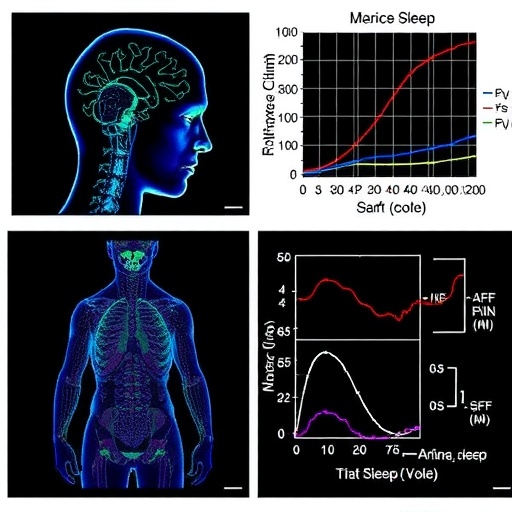In a groundbreaking correction to previous findings, researchers Sochal, Ditmer, Binienda, and their colleagues have sharpened our understanding of the intricate web binding neurotrophins, mood regulation, and physical activity amid the pervasive challenge of sleep deprivation. Published in Translational Psychiatry, this updated study delves deeply into the biochemical and behavioral cascades influenced by chronic lack of sleep, shedding new light on the dynamic interactions that govern brain health and mental well-being.
Sleep deprivation has long been recognized as a critical stressor impacting cognitive function, emotional stability, and physical health. Yet the underlying molecular mechanisms remain only partially understood. Neurotrophins—proteins such as brain-derived neurotrophic factor (BDNF), nerve growth factor (NGF), and others—play a pivotal role in maintaining neuronal integrity, synaptic plasticity, and overall neural resilience. This updated work elucidates how their expression and function are modulated under the significant stress of sleep loss, influencing mood states and the capacity for physical exertion.
Fundamentally, neurotrophins act as neuroprotective agents, facilitating synaptic remodeling and offering resistance against neurodegenerative processes. When sleep is insufficient, these molecules do not merely diminish in quantity; their signaling pathways undergo complex alterations that have cascading effects on neural circuits responsible for emotional processing. The corrected data indicate that neurotrophin dynamics reflect a delicate balance, responsive not only to sleep patterns but also to lifestyle factors such as physical activity, which can either mitigate or exacerbate the neurochemical imbalance.
Mood disorders, particularly depression and anxiety, have often been correlated with disrupted sleep architecture. The correlation is more than superficial: neurotrophin fluctuations appear as a mechanistic bridge, linking sleep deprivation to mood dysregulation. Using refined biomarkers and advanced neuroimaging techniques, the authors demonstrate that decreased BDNF levels under sleep deprivation correlate strongly with increased depressive symptoms and impaired cognitive flexibility. This finding underscores the neurotrophins’ critical role as modulators of emotional resilience.
The interplay with physical activity presents a fascinating counterbalance. Exercise is known to boost neurotrophin production, promoting neurogenesis and enhancing synaptic strength. This protective effect is particularly important in the context of sleep deprivation, where physical activity seems to partially restore neurotrophin levels and improve mood outcomes. However, the study reveals that the timing, intensity, and duration of exercise are critical variables; only carefully calibrated activity elicits beneficial neurochemical responses without exacerbating fatigue or stress.
At the cellular level, sleep deprivation triggers oxidative stress and inflammatory responses which interfere with neurotrophin signaling. The research highlights the involvement of microglia activation and cytokine release, which further destabilize neuronal networks. These inflammatory mediators appear to disrupt neurotrophin receptor expression and downstream pathways such as the TrkB receptor signaling, pivotal for BDNF activity. This insight provides a biochemical framework explaining how chronic sleep deprivation leads to both structural and functional brain alterations.
Importantly, the corrected article sheds light on the temporal dynamics of these interactions. Acute sleep loss induces transient changes that may be reversible with proper intervention, including rest and exercise. However, chronic deprivation results in persistent neurochemical disturbances that may predispose individuals to long-term neuropsychiatric conditions. Identifying these temporal thresholds is crucial for developing preventative and therapeutic strategies for at-risk populations, such as shift workers, students, and patients suffering from sleep disorders.
From a translational perspective, the findings open avenues for novel intervention methods. Pharmacological agents that mimic or enhance neurotrophin activity could provide a targeted approach to mitigate mood impairments caused by sleep deprivation. Similarly, designing physical activity programs tailored to optimize neurotrophin responses holds promise for improving mental health outcomes. The correction emphasizes integrating molecular biology with behavioral science to craft comprehensive treatment modalities.
Moreover, the study’s methodological advancements deserve particular attention. Employing a multi-modal approach, the researchers combined quantitative protein assays, behavioral mood assessments, and controlled physical activity interventions in a robust experimental design. This triangulation strengthens the validity of their conclusions, overcoming limitations of prior research that often focused on isolated variables without considering their interactive effects.
This correction also highlights the importance of personalized medicine. Individual differences in sleep architecture, genetic predispositions affecting neurotrophin expression, and baseline physical fitness levels contribute to variability in how sleep deprivation impacts mood and cognitive function. Future research inspired by these findings might explore genotypic markers that predict susceptibility or resilience, paving the way for bespoke treatment strategies.
The broader implications extend to public health and workplace policies. Understanding how sleep deprivation modulates neurotrophins and mood can drive reforms in work schedules, educational demands, and lifestyle recommendations. Enhancing awareness of the neurochemical costs of sleep loss and the protective role of physical activity may motivate behavioral changes that improve societal well-being.
In summary, the corrected investigation by Sochal et al. refines the scientific narrative on neurotrophins as critical connectors between sleep deprivation, emotional health, and physical activity. It elucidates the sophisticated neurobiological interplay underlying these phenomena, combining molecular detail with clinical relevance. This research advocates for integrated approaches merging lifestyle modification, pharmacology, and personalized assessment to combat the adverse effects of sleep deprivation on the brain.
As the neuroscience community absorbs these insights, the challenge remains to translate them into practical applications that can ameliorate the widespread mental health burdens fueled by modern sleep deprivation trends. The correction is not merely an academic update but a vital step toward developing more effective interventions for enhancing mental resilience in sleep-challenged environments.
Subject of Research: Interactions between neurotrophins, mood regulation, and physical activity in the context of sleep deprivation.
Article Title: Correction: Interactions between neurotrophins, mood, and physical activity under the conditions of sleep deprivation.
Article References: Sochal, M., Ditmer, M., Binienda, A. et al. Correction: Interactions between neurotrophins, mood, and physical activity under the conditions of sleep deprivation. Transl Psychiatry 15, 221 (2025). https://doi.org/10.1038/s41398-025-03462-9
Image Credits: AI Generated




